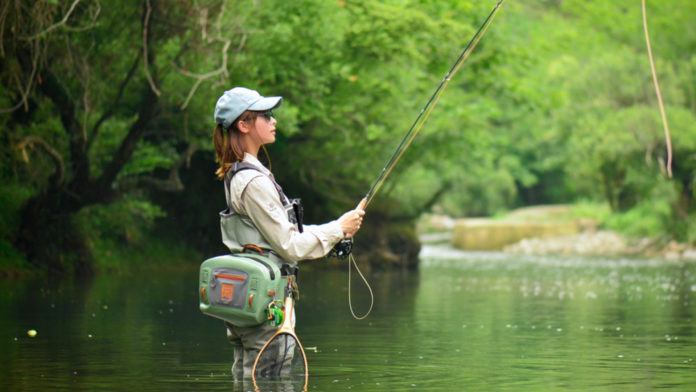For a very long time in China, fishing carried the reputation of being a low-key, modest, and somewhat unfashionable recreational activity. Seemingly a popular hobby for retirees only, recently, it has become trendy among China’s Gen Z and millennial demographics in an astonishing culture shift.
Tiantian Li, a Beijing-based art magazine editor and a fashion micro-influencer in her mid-20s, has been going on fishing trips with her boyfriend every single weekend since early in the summer.
“We just can’t help but keep going back,” Li tells RADII about the addictive qualities of fishing, which she and her boyfriend began to succumb to after their first outing. “On the one hand, it provides us with a great way to connect with nature and immerse ourselves in the wonder of the mountains and creeks outside of the city.”
She continues, “On the other hand, fishing requires you to have a high level of concentration and observation, so it is an excellent way to relax and to free myself from my hectic work schedule.”
Li and her boyfriend were formally introduced to the world of fishing during a two-day lure fishing (lure fishing requires artificial fish as bait) trip to a creek, where they managed to catch their first fish.
“It was such an exhilarating moment that it made us somewhat obsessed with fishing from then on,” says Li on the impact that initial experience had.
Li explains that while quite a few different fishing styles are popular in China, the most trendy among young people include lure fishing and fly fishing (using a special rod and reel and artificial fly to catch fish). Each of these styles involves exercise and goes hand-in-hand with other outdoor activities like camping and hiking.
Young Fishing Enthusiasts
“I have seen an increase in people’s interest in fishing both on social media and in my offline encounters with people,” Li says. “This trend is part of the wave of interest in getting outdoors post-Covid, but it seems to be a trend that is especially popular among young people — the unpredictability and adventure of fishing, as well as the human-nature relationships it creates, attracts the younger population.”
According to the Alibaba-backed ecommerce publication Global Netrepreneur, for this year’s Tmall 618 shopping festival, the second-largest shopping event in China, more than 300,000 people bought fishing gear online each day during the festival.
 Beijing resident Tiantian Li fishing in a creek. Image via Tiantian Li
Beijing resident Tiantian Li fishing in a creek. Image via Tiantian LiData from Tmall also shows that the percentage of these fishing equipment consumers younger than 18 years old increased by 190% compared to the previous year. In addition, in the 12 months leading up to this year’s 618 shopping festival, more than 2 million customers born after 1995 purchased fishing supplies online — a strong indication of the fishing craze among youth.
Apart from becoming a new social trend on ecommerce sites, fishing has also been trending all over Chinese social media.
In June 2021, the total search volume of the word ‘fishing’ on the Gen Z lifestyle platform Xiaohongshu was 7.2 times higher than one year ago, in June 2020, according to a report curated by Xiaohongshu seen by RADII. Users on the platform share tips on which fishing equipment to buy, the best locations for fishing, and the best outfits for fishing.
Maggie Li, a 28-year-old film producer based in Shanghai, made a trip to her uncle’s fishing pond in Lianyungang, a city in Jiangsu province, during China’s National Day holiday in October. Growing up going to the pond two or three times a year, Maggie says the number of young people at her uncle’s fishing pond has recently increased, with some coming alone and others coming with their families.
“It’s become a trendy hobby as far as I can tell. My uncle says there has been a surge of young people fishing in the pond for leisure,” says Maggie. “I also have WeChat friends who post about their fishing trips, sometimes very early in the morning.”
Fishing Influencers
According to the 2020 Douyin Stats Report, fishing has become the most popular sport for users of Douyin (China’s TikTok), with related videos attracting more than 800 million likes on the platform. The rise of fishing influencers, such as Deng Gang and Liu Zhiqiang, who share fishing videos online, has also significantly contributed to this trend. Videos with the ‘fishing’ hashtag have been played more than 82 billion times on the platform to date.
Deng Gang, the best-known fishing influencer in China, garnered more than 10 million followers on Douyin in just one month in May of this year and has now reached around 25 million fans on the platform. His success can be credited to his legendary videos, in which he catches an enormous amount of fish in a short period.
In one epic video, he exchanges somewhere between 50 to 100 pounds of fish he has caught with the pond manager for a lamb.
“Fishing was already pretty popular, but Deng Gang made the activity known to the general public, especially among young people,” says Louis Lu, a 20-year-old university student. While stuck in China due to the pandemic, taking online classes for his university program in the US for the past year, Lu found fishing — his new weekend hobby.
 Tiantian Li is fishing in a suburb of Beijing. Image via Tiantian Li
Tiantian Li is fishing in a suburb of Beijing. Image via Tiantian LiWhile his initial introduction to fishing had little to do with online fishing celebrities, Lu admits that this new online fishing sensation has played a significant role in reviving and promoting the traditional sport that dates back thousands of years.
Since traveling to a fish pond in the Shanghai suburbs with a friend in 2020, Lu has been going back almost every week.
Tiantian Li, on the contrary, is not familiar with the trend of fishing videos on Douyin and has never heard of Deng Gang. Rooted in Xiaohongshu initially as a fashion blogger with more than 5,000 fans, she has been sharing fishing tips, fishing outfit ideas and other knowledge on the lifestyle platform.
Middle Class, Urbanities, Male
Since most ponds, natural creeks, and lakes where people can fish are located quite far from city centers and often require a car for transportation, there are certainly barriers to entry for this leisure activity.
In addition, purchasing fishing gear can cost anywhere from a couple of hundred yuan to a couple of thousand, so fishing attracts a relatively well-off demographic who tend to have both free time and disposable income.
Unlike other rising outdoor trends such as glamping, which has been on the receiving end of criticism for being pretentious and merely a means of gaining social media exposure, the commitment of fishing suggests that only hardcore fishing enthusiasts will return.
As Lu explains to RADII, “Fellow fishing lovers I have met at pay ponds are all from different professions. I’ve met a library manager and people from finance backgrounds.”
 A fishing blogger inspects his catch. Image via Xiaohongshu
A fishing blogger inspects his catch. Image via XiaohongshuHowever, the divide between genders and city tiers prevails. “Over 95% of the people I’ve seen at the ponds were male,” Lu reflects.
“I think there is a difference between tier-1 and tier-2 or tier-3 cities when it comes to their love for fishing,” says Maggie, speaking on her observations about fishing in different cities. “Young people in tier-1 cities might care about more photogenic spots and more professional gear, or might even go all the way to the ocean to fish, to get more social media-friendly photos. Fishing in lower-tier cities is more about the experience of community.”
Tiantian Li, meanwhile, wants to contribute to building a stronger female fishing community.
“I notice there are not a lot of fishing outfits available online for females. They mostly come in male styles. Like, there are not even suitable sizes of professional fishing pants or shoes for female anglers. I hope I can at least bring some helpful changes,” she says.
It remains to be seen whether fishing will be a more transformative force in shaping young Chinese people’s relationship with society. Still, it has already brought notable changes to how they perceive their ties with nature, work, and life.
Cover image via Xiaohongshu
Credit: Source link































